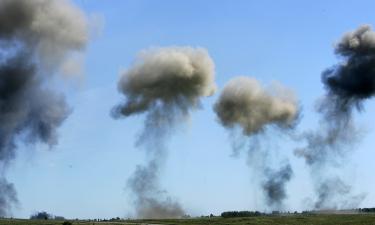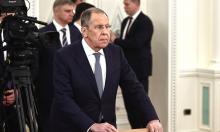Islamophobia in Russia
All attempts to provoke Islamophobia in Russia have failed, Russia President Vladimir Putin said at a summit of the Organization of Islamic Conferences (OIC) that has opened in Malaysia today
Vladimir Putin has been invited to the OIC summit as a guest. Being at the summit, the Russian president declared that Moslems were a valuable and integral part of the Russian people. "This inter-religious harmony guarantees the strength of the country and accounts for its well-being and strength," Vladimir Putin added. After decades of prohibitions imposed on religious education, there are over 100 madrasahs and other religious educational institutions in Russia. While the number of mosques in Russia was 870 in 1991, this number has increased to over 7,000 today.
Russia's president believes that terrorism must not be identified with any particular religion. Vladimir Putin emphasized that "as for terrorism, the most dangerous threats of the present day, Russia's position is consistent and understandable: terrorism must not be identified with any particular religion, cultural tradition of mode of living." The Kremlin thinks that OIC is a convenient platform to take up the issue of financing international terrorism by Islamic nongovernmental organizations.
The very fact that Russia was invited to the summit as a guest is important for the country. First, this allows Russia's to increase its role in the political and economic life of Islamic countries. Second, this provides new opportunities for development of bilateral relations and serves an important impulse to better political contacts with Islamic nations. What is more, the guest role "gives a nice opportunity to popularize what is going on in Russia and to take up issues that are burning for Russia," according to the presidential administration. Financing of terrorism by Islamic nongovernmental groups is a burning issue. The source in the administration said: "To take up this issue tet-a-tet differs from the use of the OIC's authority and Russia's participation in promotion of its pragmatic objectives."
The presidential elections in Chechnya and political regulation in the republic have increased Russia's authority in the Moslem world. The source in the Kremlin says the partner role of Russia with the OIC has no connection with the Chechnya elections. "I would not say the invitation to the summit is somehow connected with the presidential elections in Chechnya. Indeed, it would be more difficult for Russia to participate in the forum if the situation in Chechnya developed in a different way; if there were no normal political process in the republic, no legitimate elections and leadership," the source in the presidential administration stated. The Russian delegation participating in the summit includes newly elected Chechen president Admad Kadyrov. The Kremlin source also touched upon the traditional relations between Russia and many of Moslem countries. It believes that "all questions that Islamic countries have asked may be answered today." At the same time, it is stated that "following the tradition, many Islamic countries are still reserved with respect to Russia." The interlocutor from the Kremlin thinks this is connected with the corporate views still pertaining to the OIC with respect to Moscow.
The interlocutor says the invitation to the OIC summit is "the actual appraisal of Russia's role among Moslem countries given on the top political arena which in its turn evidences the increase of its authority in the Islamic world. This is an estimate given by Moslem countries to what is being done in Russia to develop the inter-confession dialogueand attitude of the Russian government to Moslems."
The source from the Kremlin says that Moscow does not pursue the objective of full membership in the OIC; the organization consists of 57 Islamic countries that are members and of several observers. This time the Russian president is participating in the summit as a guest, but it is not ruled out that in the future Russia will be given the status of an observer or even full member. At the same time, the source admits that the OIC is "a structure complicated from a hierarchic point of view" where decisions on membership of other countries are made on the basis of an official appeal and are considered on all levels of the organization.
The Kremlin Administration thinks that even though the status of Vladimir Putin at the summit is guest, his participation in the event is even more substantial. The Russian delegation is even allowed to deliver a speech at the summit. That is why, the source says, the invitation to the forum has political importance and is in fact a serious factor. This is adequate to Russia's participation in international affairs and also in everything connected with the Islamic world.
Putin to reconcile Moslems and Christians
Vladimir Putin stated that "the whole history of Russia disproves the still popular opinion of an insurmountable conflict between the Christianity and Islam." The Russian president said in his speech at the summit that during the 20th century, Russia has been supporting many of the IOC countries in their course toward national independence. Russia rendered them with practical assistance in the formation of their industrial bases and social infrastructures. Today, Russia is actively developing contacts with majority of OIC members thus following the mutually beneficial traditions of cooperation and respect toward each other.
Islamophobia in Russia: Myth or Reality
Moslems, the people with the centuries-long traditions, are the largest after Orthodox Russians confession in Russia. They are technically more numerous and more free than ever over the whole history of Russia. During the past decade, after the 70 years of propagated atheism, Islam is experiencing renaissance; the large-scale program for construction of mosques is being carried out; thousands of people start observing the rituals that their grandparents had performed.
But simultaneously with the Islam revival, millions of people following the religion in Russia say they have started feeling the ephemerality of security. People say they are once again experiencing the fear which they believed had gone together with the breakup of the Soviet Union. This fear has been gaining steam during the post-Soviet period, each time growing stronger or weaker according to developing of the Chechnya war; it increased once again after the 9/11 terrorist attacks in the US and the hostage taking in the Moscow theatre a year ago. Law enforcement structures say the number of crimes connected with ethnic hatred has increased all over Russia; in some cases, this refers to the ethnic belonging of victims while other crimes are alleged to be having Islamic roots.
Russia President Vladimir Putin does his best to sound prudent and repeats Islam is peace-loving religion and cannot be used as a synonym of terrorism. But from time to time the Russian president resorts to exciting rhetoric and says the Chechen war is part of a broader war between Islam and Christianity. Then the president said that people felt in danger if they were Christians. Is it logical that today the president uses quite different words?
Subscribe to Pravda.Ru Telegram channel, Facebook, RSS!





